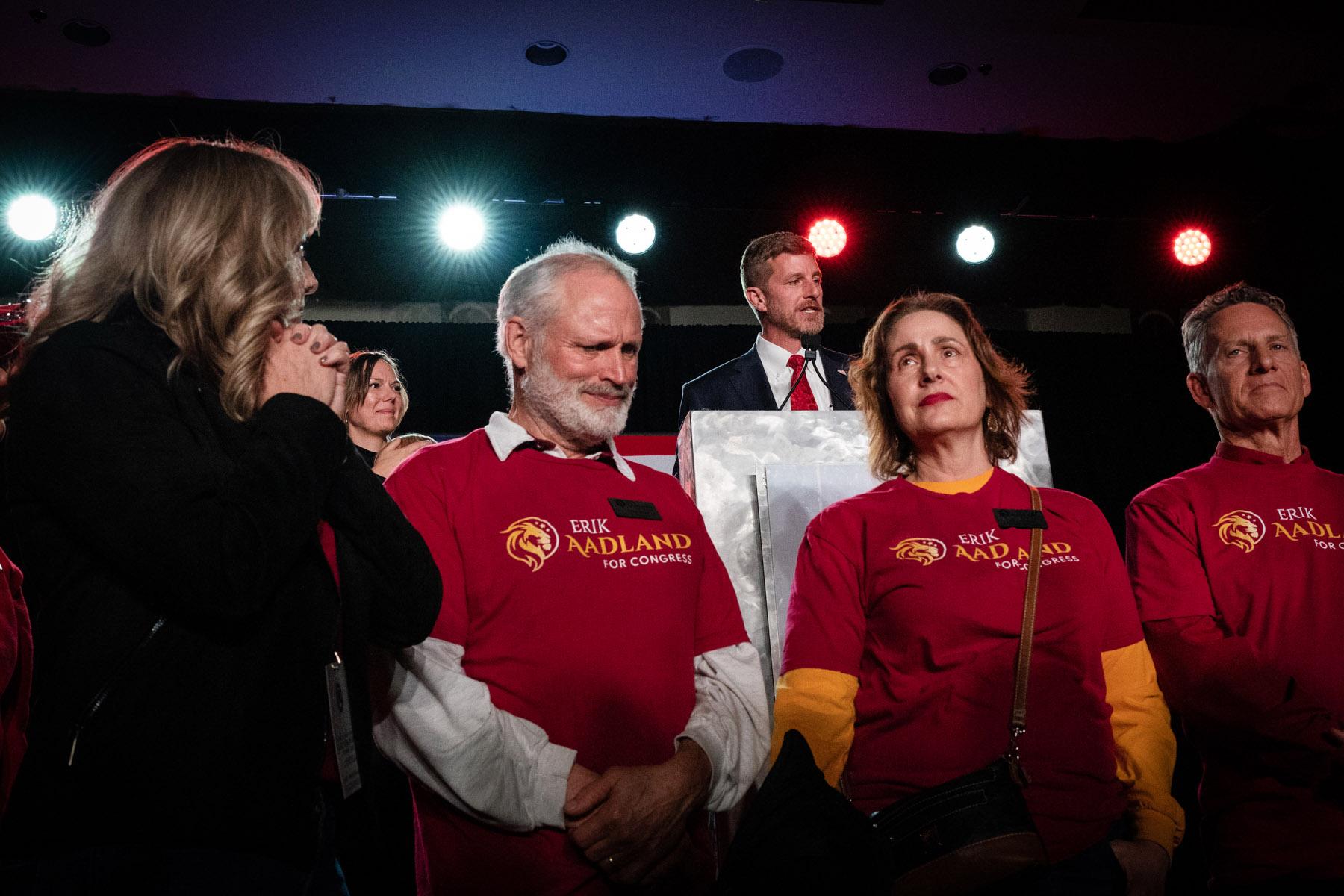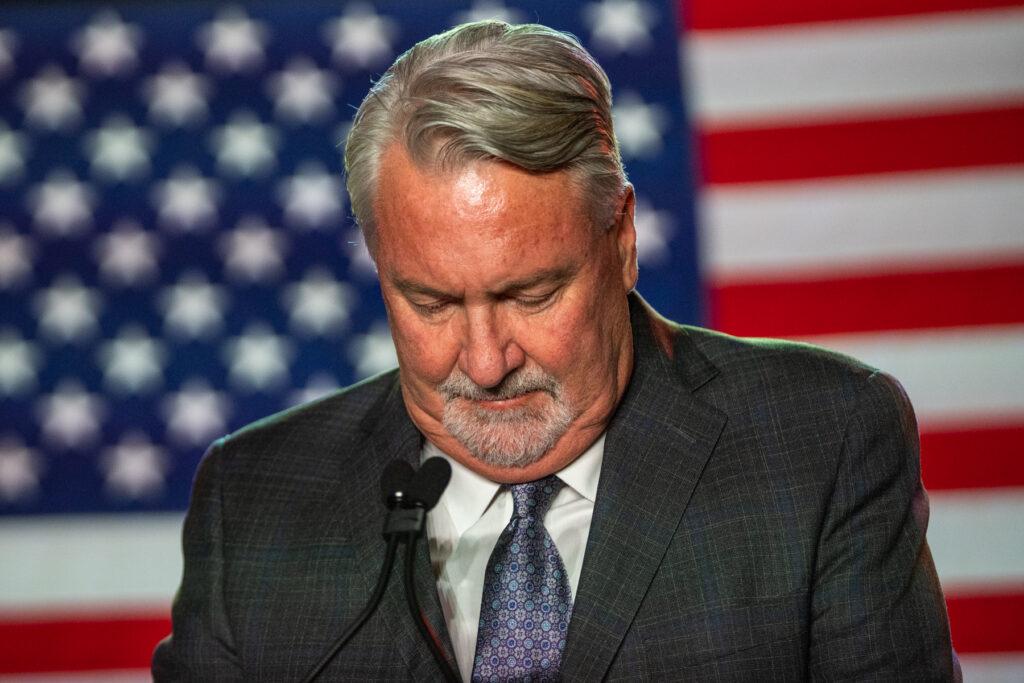
Republicans were hoping to make gains in Colorado this election.
The party recruited more moderate and younger candidates, women, and people of color, and focused largely on pocketbook issues. And given an unpopular sitting President and Democratic control in Colorado and nationally, the focus of the media and political observers was the scope of the inroads Republicans would make.
Instead, the opposite happened. A blue wave hit Colorado and left Republicans in a worse spot, with deeper electoral losses than they ever imagined, shocking both Republicans and Democrats alike.
“Honestly I think Colorado Republicans need to take this and learn the lesson that the party is dead. This was an extinction-level event,” said Republican state Rep. Colin Larson. “This was the asteroid that ended the reign of the dinosaur, and in this case, the dinosaur was the Republican party.”
Larson’s pessimism is understandable. He was poised to be the incoming House minority leader after the sudden death of state Rep. Hugh McKean. Instead, Larson unexpectedly lost his own race in Jefferson County.
He was already the last Republican representing the suburban county just west of Denver. That’s a huge shift from just a decade ago when Jeffco was considered one of the swing regions of the country and a focus of both candidates during the 2012 presidential race.
Republicans lost seven seats in the state legislature, and another Republican state senator had become a Democrat prior to the election.
This leaves the party with less than a third of the seats in both chambers, the deepest Republican minority in state history.
“Frankly, it couldn't be much worse,” said Dick Wadhams, the former chair of the Colorado Republican Party. Wadhams largely blamed demographic shifts and the national Republican brand.
“And I think we put up very strong candidates who were worthy of consideration by all Colorado voters and yet they were soundly rejected in favor of Democratic candidates,” Wadhams said. “So I don't know what it's gonna take for this to come back the other way.”
And it wasn’t just the statehouse, the losses were steep at the top of the ticket as well. Democratic Gov. Jared Polis defeated Republican Heidi Ganahl with nearly 58 percent of the vote, and even won in the Republican stronghold of Douglas county where she lives.
Larson said he thinks it’s going to take a seismic shift to turn things around and said both the local and national party must fully repudiate former President Donald Trump, the January 6th insurrection, and election denialism. He believes only then would enough voters in the state even consider Republicans as a “serious viable option.”
“January 6th, we just thought it had fallen from most people’s minds,” he said. “That just was not the case. They weren’t willing to look past the party.”
Larson said it’s even difficult for him personally. Although he’s always voted for Republicans, if Trump is the party’s presidential nominee in 2024 he said he couldn’t back him.
“We don’t solve our problems with violence and insurrection and conspiracy theories,” Larson said.
Jan. 6, 2021, was a turning point for Dana Basquez, a voter from Lakewood. For much of her adult life, she was a Republican. She became a Democrat about a decade ago, but even then she said would consider Republican candidates and normally split her ticket. After January 6th that all changed.
“On January 6th it was cemented in my brain that I cannot trust these people,” Basquez said. “That our nation, everything that I hope for my grandchildren is in jeopardy.”
She grew up in a Republican family in Texas and said her father voted for Trump both times. She said he regretted it and was heartbroken at the state of the Republican party.
“They were trying to overthrow our government. He felt he had played a part in that. And that man was 86 years old, had suffered with prostate cancer for better than a year,” Basquez said. “And he was gone by May. He was just devastated by what they did.”
Some candidates did try to distance themselves from Trump, but it still didn’t help. Democratic U.S. Sen. Michael Bennet handily defeated Republican businessman Joe O’Dea, even though O’Dea broke with Trump, defended the 2020 election, and took relatively moderate positions on abortion rights, immigration, infrastructure, and same-sex marriage.

Zack Roday was O’Dea’s campaign manager and said they knew going into the race that defeating Bennet in a state Trump lost by 13 points, was a longshot, but they didn’t expect the margins to be as wide as they were.
“Our polling did show that it was tightening, the public polling did show that it was tightening and history. I mean the incumbent [President] was under 50 percent in all credible polls,” Roday said. “Gravity, midterms, all of that indicates that the challenger is gonna close hard and fast."
But as the election approached the campaign started to see troubling indications about the Republican party’s brand. Roday said the campaign sent text messages and received some responses along the lines of, “I really like this guy. This is the type of guy I could support. I'm just not voting Republican right now.”
O’Dea did perform several points better than Republican gubernatorial candidate Ganahl, who courted leaders in the election denial movement, and drew attention for her embrace of “parents’ rights,” and unsubstantiated claims that children are “identifying as cats … all over Colorado” and schools are “tolerating” it.
Roday said this election showed that the Republican party’s problems are bigger than any one candidate.
“It's reality that (Trump) lost the midterms for us in 2018,” Roday said. “He lost the White House in 2020.”
Roday said that effectively put a limit on what the party could achieve, “in what should have been an extremely favorable environment in 2022. And there's only one way to move forward, and that is to shed ourselves of that cancer.”
Still, he said he was proud that O’Dea stood up to Trump publicly.
“Going toe to toe with the former president of the United States and not backing down, that is in the history books. Even with us coming up short,” he said.
Votes are still being tabulated, but by winning about 42.4 percent of the vote, O’Dea narrowly outperformed Trump’s 41.9 percent share of the Colorado vote in the 2020 general election. That race had 23 candidates dividing votes, compared to just five in this year’s Senate race. In both cases, the Libertarian candidate was the biggest third-party draw, with 1.61 percent of the vote in 2020 and 1.7 percent this year.
Republicans also narrowly lost Colorado's new 8th Congressional District and Republican U.S. Rep. Lauren Boebert’s race in the 3rd Congressional District is still too close to call, in a seat where Republicans hold a 9-point advantage, although she is leading her Democratic opponent Adam Frisch.
Some Democrats point to the Supreme Court and the Roe v. Wade decision as the turning point that helped them and mobilized voters. For Democratic U.S. Sen. John Hickenlooper, who was not on the ballot, it comes down to Colorado having what he believes is one of the strongest economies in the country.
“I'm not saying it's perfect here. And there are a lot of people feeling inflation and the interest rates on their credit or credit bill or on their house mortgage, they care about that,” Hickenlooper said. “But they're also more optimistic and they feel our future's good. That's not true everywhere in America.”
But as the dust is settling, at the state level, Colorado Republicans will next have to figure out how to slow or moderate Democratic priorities in the state legislature, despite not having the votes to stop anything. Even though the party was already in the minority, Larson said with fewer Republicans, Democrats now have even less incentive to tack to the middle.
“There’s going to be a lot of negative policy outcomes from not having a sane and relevant loyal opposition party,” he said, noting that despite some strong new members, some of the more moderate lawmakers are no longer at the Capitol.
Former Democratic state Rep. Tracy Kraft-Tharp agrees that having more Republicans at the statehouse can be a good thing. She was term-limited in 2020 and is now a Jefferson County Commissioner. During some of her time at the Capitol Republicans controlled the state Senate.
“Actually it worked out really well. It forced people to be able to negotiate, work together, find common ground in order to get things done,” Kraft-Tharp said.
And now with Republicans out of power at the state and federal level, local races may become an increased area of focus. When Republican Congressman Mike Coffman lost his re-election bid in 2018 he went on to become the Mayor of Aurora.
“It's clear that it's a blue state statewide, and Republicans can be successful in certain districts or certain pockets of the state and city council,” said Michael Fields, the head of the conservative Advance Colorado Institute.
Fields has helped spearhead successful ballot initiatives in recent years including proposition 121 which lowers the state income tax rate from 4.55 percent of income to 4.40 percent of income. It had widespread support and passed in every county in the state except Boulder.
“We can win on issues. We just cut taxes and 65% of voters agreed with us. They're still paths to enact policy,” Fields said. “And I think policy is the most important thing. And we haven't had power for four years (when Republicans last controlled the state Senate), but we've done a lot on the policy front, regardless, as conservatives.”








